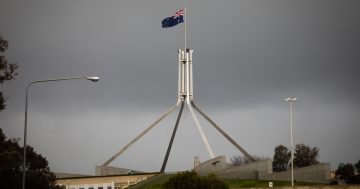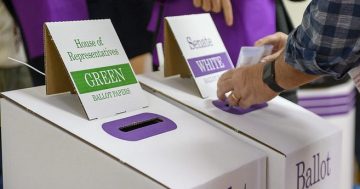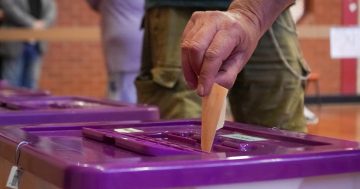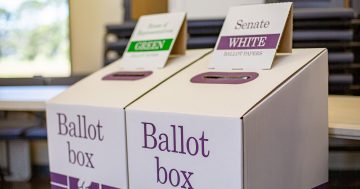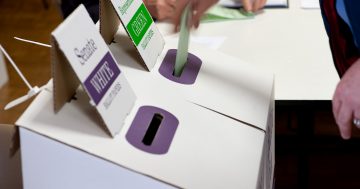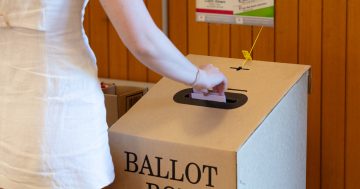Catherine Marshall* says that as the US midterm elections have shown, the right to vote is the most valuable thing when we don’t possess it, and the most disposable when we do.
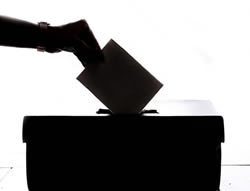 Universal suffrage is a beautiful thing.
Universal suffrage is a beautiful thing.
So priceless is it, many societies (including Australia) once reserved it for only the most elite of their citizens: those who owned land or were educated or socially elevated.
Other countries apportioned partial votes which were weighted according to one’s qualifications, so that those already in possession of skills and resources were further advantaged with a dose of electoral power, too.
So invaluable was this franchise, it was withheld entirely from women and people of colour — those two groups deemed to be inferior to white men and therefore not up to the task of voting on matters of importance.
Australian women were given the right to vote in Federal elections in 1902; Indigenous Australians had to wait another 60 years before being granted the same opportunity.
But despite its inherent worth, something strange happens to the vote after it’s been gifted to us: like the new car we’ve driven off the showroom floor and on to the road, it immediately loses its value.
The shimmer it exuded when it was still beyond our grasp turns dull once we see it close up.
It’s the most valuable thing when we don’t possess it, and the most disposable when we do.
Millions of apathetic Americans discovered this to their regret when a minority of voters who showed up to the polls at that country’s 2016 presidential election managed to elect that improbable candidate, Donald Trump.
But those abstainers who were shocked by the result, and who cried foul at Trump’s dubious promotion, had only themselves to blame: this was a classic case of democracy in action.
Notwithstanding the complexities of the US electoral colleges, which helped skew the result, the people had voted for Trump, and so he became their President.
Voting is much like vaccination: unless the majority of people participate, the results cannot be trusted.
The consequences are, however, uniformly distributed: we all get the Government we deserve — especially those who choose not to cast their ballot.
Americans know this, and appeared to be correcting their earlier mistake at last week’s midterm elections.
It’s for this reason that compulsory voting — such as that legislated by Australia and around 30 other countries — is so important.
It is easy to take one’s vote for granted when it hasn’t been fought for; but when it’s been withheld from you, it assumes an enormous importance — not because of what it symbolises, but because it has the power to effect policy and so change how your world is run.
Black South Africans know this well; when they were enfranchised in 1994, they clutched their votes as though they were precious slabs of gold.
They queued up in the pouring rain and the burning sun for hours to cast their ballots; they came from the furthest rural outposts, the old and the infirm, struggling to the booth so that their voices could be heard.
Yet many of those who are subject to the policy of compulsory voting oppose it.
Such methods directly contradict their freedom of expression and choice, they say.
It’s a curious inversion of the reaction from those denied the right to vote, such as the suffragettes, who did everything in their power to claim it.
And it prompts the question: in a world beset with voter inequality (including the voter suppression used to prevent certain groups from voting in the US), can the refusal to vote ever be justified?
Or can the act of refusing to vote be interpreted as a wilful attempt to disenfranchise oneself?
Of course, no-one can really be forced to vote.
In Australia, people of voting age are forced under threat of a fine to show up at the polling station; they may spoil their votes.
But the policy of mandatory voting aims to ensure that the occupants of the country’s parliaments are communally determined by its entire electorate, rather than a small number of people with vested interests.
Voting can be seen, then, not as a freedom which people might politely decline, but as an unnegotiable civic duty.
Lest we take our own franchise — and high voter turnout — for granted, perhaps we should perceive this country’s system through the outsider’s eyes: “Woah,” Tweeted American author Gabrielle Blair earlier last week after attending a festival in Sydney.
“They have mandatory voting in Australia.”
“Voting happens on a Saturday.”
“The whole community comes out and celebrates with sausages.”
“We can create the voting culture we want …”
As a veteran of numerous Election Day cake stalls, I pointed out to Blair that not only do we have sausages, we have cake as well.
Let the Americans eat cake, and maybe then they’ll stop taking democracy for granted.
* Catherine Marshall is a Sydney-based journalist and travel writer.
This article first appeared at www.eurekastreet.com.au.


